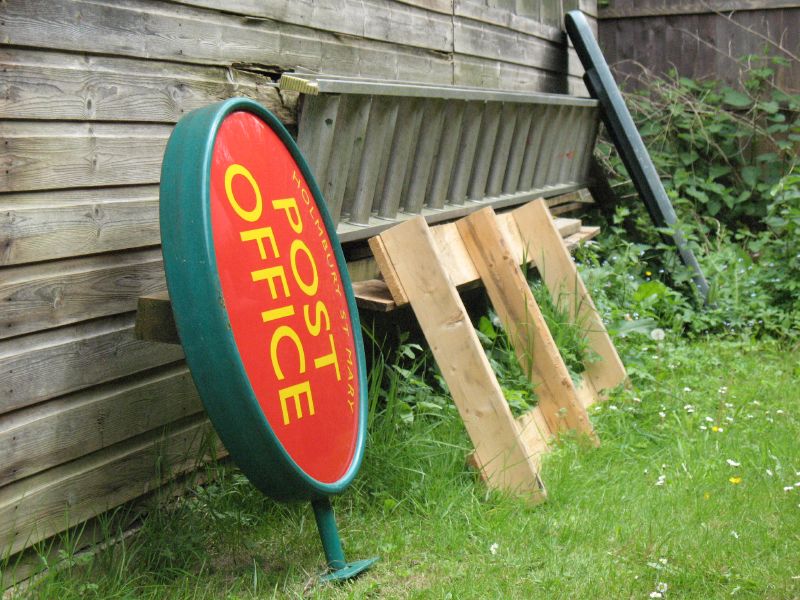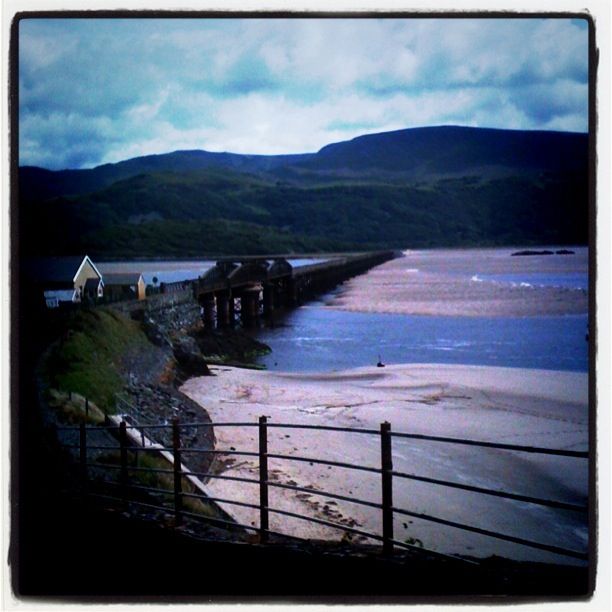 It’s a sunny evening in Fairbourne, a coastal village in rural Wales. Inside a small food shop, I’m listening to the owner and his wife discussing the true nature of the holy spirit.
It’s a sunny evening in Fairbourne, a coastal village in rural Wales. Inside a small food shop, I’m listening to the owner and his wife discussing the true nature of the holy spirit.
I reach for a packet of breakfast cereal. “The woman just didn’t understand,” says the shopkeeper.
I place a tin of tomatoes into my basket. “I told her the holy spirit is not a thing,” he says.
I wander along the narrow space between the shelves into the back of the shop. It’s quiet here and there are no windows. On the left, a line of dusty red wine bottles sits opposite bags of bread. On the right, racks of stationery and cheap plastic toys. In the corner there’s a disused Post Office counter. In a village, it’s common for a shop and postal service to run from the same premises. That used to be the case here.
My basket is full, so I return and place it on the till. “I explained to her that it is Him,” the shopkeeper says to his wife.
The man is in his 60s. He has white whiskers, ruddy cheeks and small intense eyes. He’s affable and introduces himself. He asks if I’m visiting, if I’m on holiday?
I say that I’m staying down the road at Garthyfog farm.
Yes, we agree, the weather is lovely today.
Behind the counter, the shopkeeper’s wife is peering at the prices on my items, scrawled in biro onto the cans and boxes. Hunched over the till, she depresses each key as she types in the sums. Her thin shoulders poke out of her cardigan.
As the items tot up, I realise that I don’t have enough cash in my pocket to pay for it all. “Don’t worry,” says the shopkeeper. “You can come back tomorrow and pay me then.” He insists.
It’s a very kind offer, but I have to refuse. I place the breakfast cereal back onto the shelf.
The shopkeeper offers to help me carry my bags to the car. As we walk, I ask him if he has lived here for long. Yes, but he and his wife have been in prison recently, he says. He didn’t say for how long.
I assume he’s joking, but it soon becomes clear he is not. It was fraud, he explains, though he’s not specific. It was to do with the Post Office. “My problem is that I have a big mouth,” he says.
I remember the disused counter in the back of the shop.
He and his wife pleaded guilty in court. “We’re just trying to rebuild our reputation in the community now,” he says.
I think of his wife, sitting on her stool back inside the shop. What court would have jailed that woman? What did the pair of them do to deserve such a punishment?
 We walk on a bit more, and the subject moves onto our surroundings. We agree that the scenery is beautiful. Fairbourne sits on the south bank of an estuary. Where the river meets the sea, boats lean over on sandbanks. A wooden railway bridge connects the town with the seaside resort of Barmouth across the water. You can walk across it for 90 pence.
We walk on a bit more, and the subject moves onto our surroundings. We agree that the scenery is beautiful. Fairbourne sits on the south bank of an estuary. Where the river meets the sea, boats lean over on sandbanks. A wooden railway bridge connects the town with the seaside resort of Barmouth across the water. You can walk across it for 90 pence.
Scree-lined hills drop down into water. Patchy gaps in the grass reveal loose grey volcanic rocks beneath. As the Iapetus ocean sank during the Ordovician, huge volumes of magma pushed up from below to form the backbone of the nearby Cadair Idris mountains.
The shopkeeper gestures up at the hillside, “There’s no way that this is older than 6000 years,” he says.
“I mean look at that, it’s always changing. How can they know for sure that it’s older? The ocean acidity shows it. They weren’t there to see it.”
He probably knows his views are provocative. Before I say anything, he moves onto evolution. The thing is, he says, they’ve never actually found a link between man and ape, a species in between. They can’t know because they haven’t actually seen it.
I’m at a loss about how to reply. I’ve always wondered what I would say if I met this shopkeeper. If you asked me beforehand, I’d have wanted to argue. To lay out the evidence for why he was so wrong. But I’m still a bit bowled over by how quickly the man confided in me about his prison stint. And more so I’m struck by how he had kindly offered to trust this stranger from London to pay him back for the shopping on another day. He is also helping me lift my bags now.
“You should know that I studied geology and my job is to write about science,” I say. “So you’re probably telling that to the wrong person. It’s not true.”
He waits, but I don’t have anything else. The plastic from the shopping bag is cutting into my fingers.
“Well, you should come back to the shop tomorrow! We should continue. You probably know much more about it than me. You’re staying nearby?”
He helps me lift my bags into the car, and we part ways.
Later, I search for the shopkeeper online. Robert North, a lay preacher, stole £64,700 from a post office that operated within his shop, according to BBC News.
North used the money to pay bills and building work, the court heard. The theft was discovered after an audit in December 2008. The postmistress was his wife, Annette.
“You have abused your wife’s devotion to you. You have taken advantage of you dominance over her,” the judge told North. “You persuaded her to do a dreadful thing knowing her liberty would be affected, and all because you took a calculated risk.”
North was sentenced to two years. Annette North got 15 months.
On the following day, my wife and I drive through Fairbourne. The weather is awful today. Overnight, I’ve been mulling about whether to return to the shop.
Through the car window, we see North collecting items from outside his shop, to stop them getting wet. The rain is really coming down now. North is struggling to see.
My windscreen wiper sweeps across, and he’s disappeared back inside.
__________
Richard Fisher is a feature editor at New Scientist, covering technology and geology. Before that he was deputy news editor, and his beat was space, physics and earth science. His work has allowed him to watch an online siege from the inside, control a computer with his brainwaves and build a steampunk device from lego. He lives in London with his wife, Kristina. He tweets at @rifish. Interested parties may seek further information at:
 Why Facebook friends are worth keeping
Why Facebook friends are worth keeping Appland: How smartphones are transforming our lives
Appland: How smartphones are transforming our lives- The Defenders: Inside an online siege
Photo credits: top picture – rockinpaddy; bottom picture – Richard Fisher, using the Instagram app